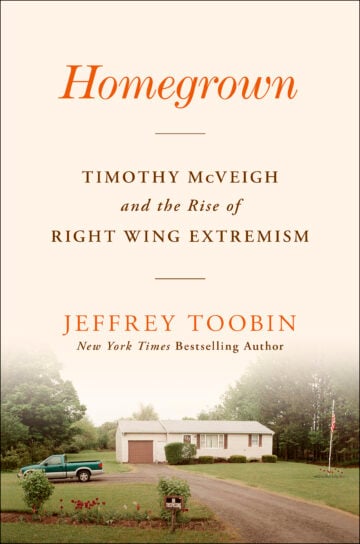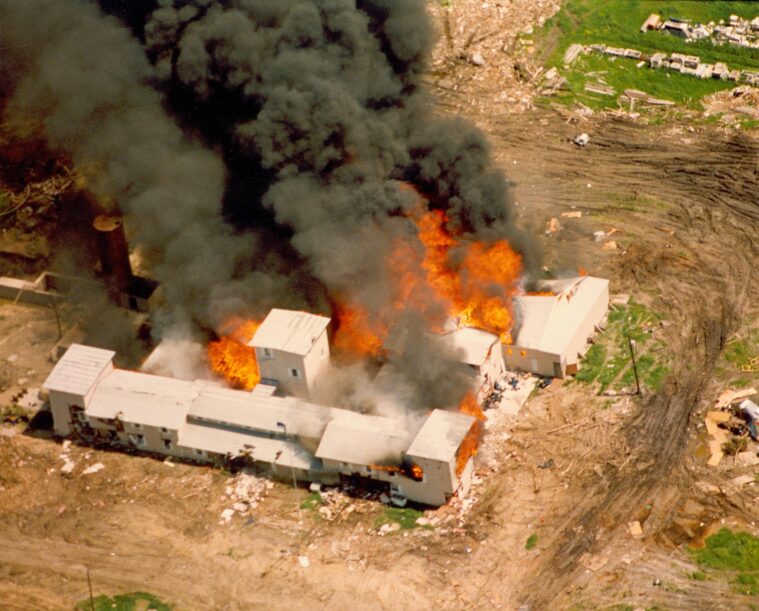On January 6, 2021, supporters of former President Donald Trump—many toting crosses and Trump flags, some with tactical gear and guns—smashed their way into the U.S. Capitol building, seeking to stop certification of Joe Biden’s victory. As we watched the mayhem on TV, perhaps the question that crossed my mind also occurred to you: How the hell did we get here?

One obvious answer involves Trump’s bogus election fraud claims, the logical endgame of a presidency built around grievance, paranoia, and wild falsehoods. But as one-time New Yorker legal reporter and former CNN legal analyst Jeffrey Toobin shows in Homegrown: Timothy McVeigh and the Rise of Right-Wing Extremism, the road to January 6 can be traced back at least a quarter century to the 1995 bombing of the Murrah Federal Building in Oklahoma City, which killed 168 people, including 19 children. The perpetrator, Timothy McVeigh, embodied the anti-government, gun-obsessed, white supremacist rage evident on January 6—a politics of rage that has moved from the fringe to very near the center of conservative politics (think Tucker Carlson, Marjorie Taylor Greene, or of course, Trump himself). Though McVeigh was executed in 2001, Homegrown, released May 2, shows that his story is very much a story for today. Moreover, though the bombing took place north of the Red River, it is both a Texas story and a national one.
As befits the second-deadliest instance of domestic terrorism in U.S. history (exceeded only by the 1921 Tulsa Massacre), there is no shortage of work on the Oklahoma City bombing. Besides a compelling 2017 American Experience documentary, Richard A. Serrano’s gripping One of Ours (1998) is especially evocative in describing the carnage wrought by McVeigh’s truck bomb. American Terrorist (2001), by Lou Michel and Dan Herbeck, draws on extensive interviews with McVeigh to explain his worldview and motivations.
Homegrown inevitably covers much of the same ground as these earlier works, but has the advantage of two decades’ hindsight. We learn about McVeigh’s troubled childhood, his lifelong obsession with guns, his frustration over lack of job opportunities and his failure with women (Toobin notes that he was an “incel”—lonely and unwillingly celibate—before the term existed), his rising anger against the federal government, and his attraction to right-wing extremist ideology. In the early 1990s McVeigh plugged into a growing underground community animated by an anti-government politics of grievance, including the nascent militia movement and the on-air screeds of Rush Limbaugh and Watergate-felon-turned-radio-personality G. Gordon Liddy. Especially formative for McVeigh was The Turner Diaries, a white racist fantasy book about “patriots” who spark a race war by blowing up FBI headquarters with a truck bomb—a prototype for the weapon McVeigh himself would deploy.
What moved McVeigh from inchoate rage to homicidal action—and what makes Homegrown very much a Texas story—was the disastrous 1993 siege of the Branch Davidian compound outside Waco. For McVeigh, the siege constituted a federal assault on gun rights: “He regarded guns as instruments of freedom and any attempt to regulate them, especially by the federal government, as a form of oppression,” Toobin writes. During the long standoff, McVeigh drove from his home in Florida to see the siege for himself; while there, he sold anti-government, pro-gun bumper stickers from the hood of his car. One bore the slogan: “A MAN WITHOUT A GUN IS NOT A CITIZEN.” McVeigh left Waco after a few days, but was preparing to return and make some kind of stand against the feds when the siege ended with the fiery destruction of the compound, leaving 82 Branch Davidians dead.
Over the next two years, Toobin notes, McVeigh’s reaction to Waco “exceeded mere political outrage and became a psychological obsession.” Waco, he told a friend, “drew the first blood of war.” It became his central purpose to avenge the deaths of David Koresh and his followers. As Toobin shows, McVeigh was not alone in regarding Waco as an excuse for violence. For instance, Liddy, during a radio discussion of agents of the Bureau of Alcohol, Tobacco, and Firearms (ATF) responsible for the initial raid on the Branch Davidians, urged his listeners to “kill the sons of bitches.”

McVeigh took such exhortations to heart. He chose the Murrah Building as his target because it housed an ATF office. He chose April 19, 1995, as the date for the attack in part because it was the two-year anniversary of the fiery destruction of the Waco compound, and in part because it was the date the first shots were fired in the Revolutionary War. Considering himself a modern-day Minuteman, McVeigh hoped that his attack would spark a widespread rebellion of White “patriots” to overthrow the federal government, à la The Turner Diaries.
Homegrown doesn’t offer the vividness of Serrano’s book, nor the psychological insight of American Terrorist. But it offers its own rewards. The greatest by far is the way Toobin carefully maps the road that leads from McVeigh to MAGA, January 6, and the right-wing extremism and violence we see today. Significantly, the book opens not in 1995 but with the Capitol insurrection. The insurrectionists, Toobin writes, were McVeigh’s “ideological successors”:
the obsession with gun rights; the perceived approval of the Founding Fathers; and the belief in the value and power of violence. These feelings were replicated, with extraordinary precision, in the rioters on January 6 as well as many of the other right-wing extremists who have flourished in the quarter century since the [Oklahoma City] bombing.
During that quarter century, right-wing extremists launched a “widespread wave of violence,” of bombings, assassinations, and mass killings, which Toobin describes in disturbing detail.
Toobin contends that authorities, the media, and the public have been slow to wake up to today’s right-wing extremist threats. Americans tend to associate terrorism with foreign actors like al-Qaida. Yet Toobin cites studies suggesting that most terrorist violence in the United States in the past two decades has been “homegrown”—the work of right-wing and white supremacist extremists.
Furthermore, Toobin writes, these outrages were too often “explained, if not dismissed, as the work of ‘lone wolves,’” rather than symptoms of a wider and deeper right-wing extremist threat. That’s dangerous, Toobin contends, quoting terrorism expert Juliette Kayyem: “White-supremacist terror is rooted in a pack, a community. …When one of them puts the violent rhetoric into action in the real world, the killer is often called a ‘lone wolf,’ but they are not alone at all.”
“All the trends that McVeigh embodied came together under the forty-fifth president.”
Indeed, Toobin argues, McVeigh’s politics of grievance and rage has become the beating heart of the right wing today. “Timothy McVeigh’s legacy became clearest during Trump’s campaign and presidency,” Toobin writes. “All the trends that McVeigh embodied—the political extremism, the obsession with gun rights, the search for like-minded allies, and above all the embrace of violence—came together under the forty-fifth president.” Then, when Trump became president, Toobin writes, “the wolf pack had a new leader.”
One final irony suggests just how dramatically the right has reshaped the landscape. In 1995, FBI agents were able to apprehend McVeigh only two days after the bombing because he happened to be jailed in Perry, 65 miles north of Oklahoma City. While making his getaway, McVeigh was pulled over by state trooper Charles J. Hanger: The getaway car had no license plates. When Hanger found McVeigh was carrying a handgun without a permit, McVeigh was arrested. But in 2019, Oklahoma changed its law to allow individuals to carry guns without a permit—just as Texas did two years later. “If Hanger had stopped McVeigh under the new law,” Toobin writes, “he could not have arrested him. … All Hanger could have done was give McVeigh a ticket.”
Although Toobin’s reputation has recently been tarnished by scandal, in Homegrown he has produced the definitive book on McVeigh’s continuing legacy. This book serves as a wake-up call to the ongoing extremist threat, and a vivid reminder that, in the words of William Faulkner, “The past is never dead. It’s not even past.”







